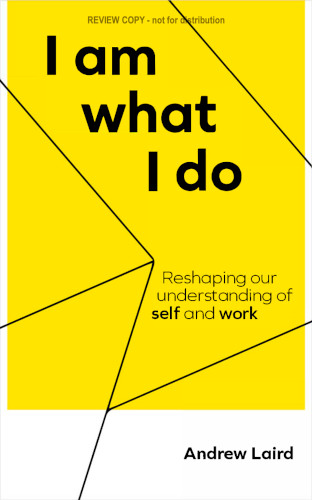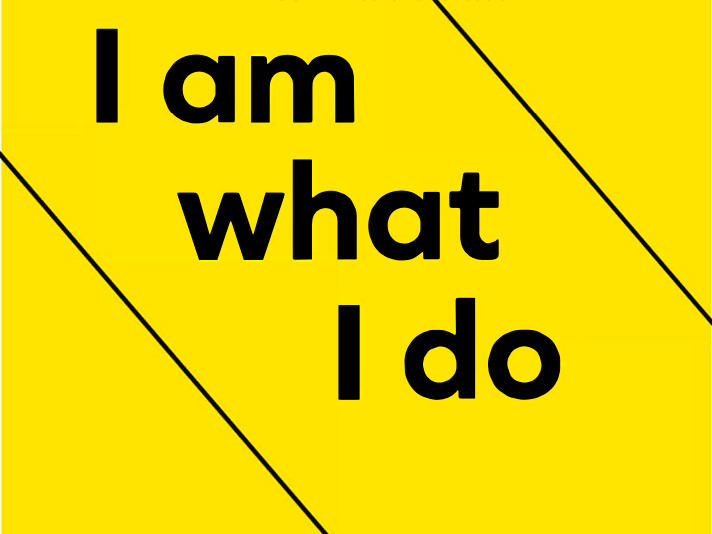An excerpt from “I am What I do” a new book by Andrew Laird.
I sealed the envelope, heart beating fast, and dropped the parcel into the post box. Inside was months of hard work. But more than that, it was my ticket to being noticed, being seen, and being praised by my industry peers. Inside was a cassette tape with my entry for the 2003 Australian Commercial Radio Awards.
Like many professions, the radio industry I used to work in had an annual awards night recognizing the best in the business. And winning (or even just being nominated) was a guaranteed way to get noticed and advance your career. But more than just helping your career prospects, winning would grant you something I desperately craved—the applause of my colleagues. That was what I hoped for most as I dropped my entry in the mail. I was only six months into my first full-time job as a radio newsreader, but the need to hear my peers’ praise was already strong.
The need to express yourself
I share that story because I suspect I’m not alone in this desire. Indeed, I’m sure I’m not—because one of the things about the individualism of our age is that it is not enough to simply ‘do you’. Rather, we need others to know about the identity that we have created for ourselves, and applaud us for it.
Back in 1985, American sociologist Robert Bellah gave this phenomenon a name: “expressive individ- ualism”. He wrote, “Expressive individualism holds that each person has a unique core of feeling and intuition that should unfold or be expressed if individuality is to be realized”.[ 1] In other words, if you truly want to be ‘true to yourself’ then you need to express yourself. It’s not enough to ‘do you’ unless you also let everyone know the ‘you’ that you ‘do’! As Noble has succinctly explained, “identity always calls for external affirmation, a witness”. [2] And our culture gives us endless opportunities to do this (social media, anyone?).
Why is this? There are at least two reasons.
Firstly, by expressing our identity we reinforce it. For example, when I make it known to you that I love road cycling, that reinforces my identity as a road cyclist.17
But more than this, we need to express our identity because we crave affirmation:
Everyone wants to be affirmed. We desire to be looked directly in the eyes by some author- ity figure (a father, mother, teacher, God) and told that we are accepted and loved.18
If our work is a key plank in how we see ourselves, then the affirmation we crave will be from our col- leagues and industry peers—and so we’ll find ourselves standing at the post box, heart beating fast, as we submit what is not simply an example of our work, but our ticket to being affirmed.
###
It was a Tuesday afternoon and a group of us were sitting around a table reviewing a sermon I had preached the previous Sunday. As the feedback came in—some of it positive, some of it referring to things for me to work on—I began to respond very defensively any time something remotely negative was said. A suggestion would be made, and I’d respond, “Yeah, but …”. Some constructive criticism would be given, and I’d reply, “Well, the reason I did that was because …”.
This went on and on until finally one of my friends at the table spoke up. “Andrew,” he said, “you know you might actually learn something and grow and improve if you stopped defending your-self and listened”.
The words cut like a knife. But my friend was spot on. I was extremely defensive when it came to criticism of my work.
None of us likes receiving criticism. But as I’ve reflected on that moment over the years since, I’ve recognized the reason for my extreme defensiveness. It was the fruit of me tying my worth in the eyes of others to my success or failure in my work. When I live by the philosophy of ‘I am what I do’, it is not simply my work being criticized: it’s me.
Therefore, how we respond when our work is criticized can be a good litmus test of the extent to which we are finding our identity in our accomplishments. If criticism angers you or makes you defensive, or if getting knocked back for a job leaves you feeling worthless, then that may be an indication that you’ve attached your worth to your work.
So the first question to ask yourself is “How do I respond when my work is criticized, or rejected, or not wanted?”
[1] R Bellah, Habits of the Heart: Individualism and commitment in American life, University of California Press, 1996, p 333.
[2] Noble, You Are Not Your Own, p 137. 22

I am what I do reshaping our understanding of self and work, Andrew Laird, Matthias Media 2023, $14.95

